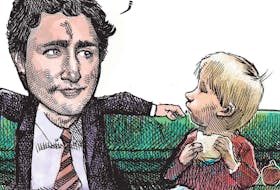
Long, long ago, in a courtroom far, far away … somebody decided it would be a good idea to sue the big tobacco companies to recoup money governments had to spend on doctors, nurses and gravediggers because people smoked, got sick and came gasping to the doors of public hospitals.
To an average person on the street or sidewalk — smoker or non-smoker — such a lawsuit would seem nonsensical. Tobacco is legal. A person is free to choose whether to use it, or not. It has been common knowledge for half a century that tobacco is addictive, and causes illness and disease, cancer chief among them.
A judge would surely take only minutes to toss such a lawsuit.
“Mr. Jones, did Imperial Tobacco force you to buy their cigarettes?”
“No, your honour.”
“Were you aware that smoking could make you sick?”
“Yes, your honour.”
“Next case!”
That scenario would be in the real world, as most people know it.
But in the world of lawsuits and lawyers, it isn’t nearly as straightforward. Nor should it be. When you’re trying to wring billions of dollars out of somebody, you better have complex complaints and questions that are immune to a blunt yes or no answer.
In a Quebec class-action lawsuit against big tobacco, in which the complainants were awarded $15 billion this week, “tens of thousands of pages of documents and testimony (were) heard over more than two years of hearings,” according to a Canadian Press story this week.
More than a million smokers were part of the lawsuit, so even a handful of paragraphs from each of them describing their woe, wheezing and unwillingness to control their impulses would easily put the lawyers over the 10,000-page mark.
It would be somewhat tacky to mock people with cancer, so let’s clarify the situation: the complainants deserve to be mocked not because they are ill, but because they refuse to take responsibility for their own actions and decisions, and prefer to blame others for their predicament.
News stories about tobacco lawsuits invariably overlook this aspect. Anti-tobacco advocates quoted in such reports always ignore it.
Not surprisingly, the tobacco companies don’t ignore it, because the legality of tobacco and people’s freewill are the crux of the issue — not health-care costs or human suffering, as exorbitant as they both may be.
The three companies that were defendants in the Quebec case — Imperial Tobacco, Rothmans, Benson & Hedges, and JTI-Macdonald — plan to appeal the decision.
The case made international news. In the U.K., The Guardian quoted a spokesperson for Imperial Tobacco saying the judgment “ignores the reality that both adult consumers and governments have known about the risks associated with smoking for decades.”
If the tobacco companies lose their appeal — and they might, because the legal system can be as outlandish as sci-fi — it could have vast ramifications for other industries.
Alcohol producers and automakers would be the next obvious targets for class-action lawsuits, whether based on human suffering or government expenditures treating victims.
“Hello, Mr. Crosbie? I got wasted and wrecked my truck. I need you to represent me in two lawsuits.”
If the ruling against the tobacco companies survives appeals, expect to see class-action lawsuits expanded to other products.
All the arguments about death and personal destruction caused by smoking can easily and equally apply to drinking. If cigarette makers are liable for the ill health of people who smoke — even when done legally, voluntarily and with full knowledge of the risks — then alcohol producers must be held accountable for the consequences of people’s drinking.
Brian Jones is a non-smoking, moderately drinking copy editor at The Telegram. He can be reached at [email protected].








